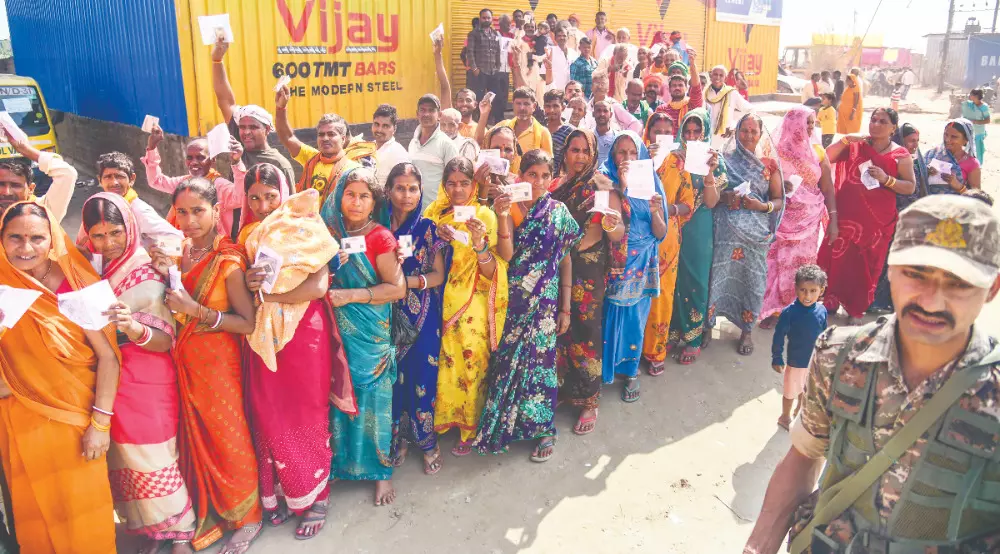
Patna, Nov. 6 -- Bihar witnessed its highest-ever voter turnout in the state's electoral history as nearly 65 per cent of its 3.75 crore eligible voters cast their ballots on Thursday in the first phase of the assembly elections across 121 constituencies. The Election Commission (EC) described the exercise as "peaceful and festive", reporting a provisional turnout of 64.66 per cent at the close of polling.
Chief Electoral Officer (CEO) Vinod Singh Gunjiyal said at a press conference in Patna that the figure could rise further as data from all polling stations were still being compiled. "At 6 pm, the turnout was around 64.46 per cent, but this number is provisional. Voters who arrived before the close of polling were still casting their votes," Gunjiyal said. Data from 41,943 of the total 45,341 booths had been received by the time of the announcement.
The first phase marks the beginning of a fiercely contested election seen as a test of the ruling National Democratic Alliance's (NDA) two-decade rule. In the 2020 assembly elections, held amid the pandemic, the turnout stood at 57.29 per cent, while Bihar's first-ever general elections in 1951-52 had recorded a turnout of just 40.35 per cent. The previous high was 64.6 per cent during the 1998 Lok Sabha polls.
Women voters appeared to play a decisive role in the record turnout. "There was visible enthusiasm among women. They came in large numbers to vote," Gunjiyal said. Prime Minister Narendra Modi, campaigning for the NDA, described their participation as a sign of hope for the alliance. "Mothers, daughters, and sisters have been the worst sufferers of 'jungle raj'. Today, they seem to have built a fortress around polling booths to prevent its return," he told a rally in support of NDA candidates.
Muzaffarpur district registered the highest turnout at 70.96 per cent, followed by Samastipur (70.63 per cent), Vaishali (67.37 per cent), and Madhepura (67.21 per cent). Patna reported the lowest at 57.93 per cent. Of the total polling stations, 36,733 were located in rural areas, indicating robust participation outside urban centres.
Though polling was largely peaceful, a few isolated incidents were reported from Lakhisarai and Saran. Deputy Chief Minister Vijay Kumar Sinha alleged that one of his convoy vehicles was attacked by Rashtriya Janata Dal (RJD) supporters attempting to "intimidate" voters belonging to extremely backward classes. The EC confirmed that 143 complaints were received during the day, all of which were promptly addressed. Polling was also reportedly boycotted in a few booths in Buxar, Fatuha, and Suryagarha.
The elections are being held under the shadow of controversy over the EC's Special Intensive Revision (SIR) of the voter rolls. Opposition parties accused the Commission of manipulating voter lists to favour the ruling coalition, a charge the EC has denied. The opposition INDIA bloc, led by the RJD and Congress, is banking on anti-incumbency and Tejashwi Yadav's flagship "jobs-for-every-home" promise to challenge the NDA's grip on the state.
Yadav, the opposition's chief ministerial candidate, faces the formidable task of breaking the NDA's long dominance in Bihar politics. The ruling coalition is relying on Chief Minister Nitish Kumar's governance record and a series of welfare measures-including 125 units of free electricity, cash transfers of Rs 10,000 each to over one crore women, and expanded social security pensions-to retain voter trust.
RJD chief Lalu Prasad invoked nostalgia and renewal in his appeal for change. In a post on X, he wrote, "If a roti is not flipped on a tawa, it gets burnt. Twenty years is a long time. A Tejashwi government is essential to build a new Bihar."
The campaign has also witnessed the entry of Prashant Kishor's Jan Suraaj Party, which has sought to position itself as an alternative to both traditional blocs. Kishor has pledged to make Bihar "one of India's top states" and declared his intention to repeal the prohibition law, calling it a policy that has drained the state's resources. His campaign has drawn interest, particularly among younger and urban voters disillusioned with the established players.
Caste arithmetic continues to shape the contours of the contest. Yadavs, Kurmis, Kushwahas, Brahmins, and Dalits are expected to play decisive roles in multiple constituencies. The outcome of the first phase will be critical in signalling voter sentiment before the final leg of the election, which covers the remaining 122 seats on November 11. Counting will be held on November 14.
The Election Commission said the successful completion of the first phase reflected voters' faith in the democratic process. As Bihar's political landscape braces for the second round, both the NDA and the INDIA bloc will be looking closely at the patterns emerging from Thursday's record-breaking turnout - a number that may well determine the direction of the next government in Patna.
Published by HT Digital Content Services with permission from Millennium Post.
